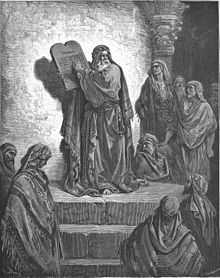Ezra

Book of Ezra
The Book of Ezra and Book of Nehemiah are the oldest sources for the activity of Ezra
Ezra is an important figure in the books of Ezra and Nehemiah and also the book of Chronicles. He was instrumental in the attempt to restoring the Jewish scriptures and religion to the people after the return from the Babylonian Captivity and is a highly respected figure in Judaism although often misunderstood.
Scholars are divided over the chronological sequence of the activities of Ezra and Nehemiah.
Josephus deals with Ezra in his Antiquities of the Jews. He uses the name Xerxes for Artaxerxes I reserving the name Artaxerxes for the later Artaxerxes II.
Outline
- 1. Return from Babylon Under Zerubbabel ( 1:1–6:22 )
- a. Return from Babylon ( 1:1–2:70 )
- i. The Proclamation of Cyrus ( 1:1–6 )
- ii. Cyrus Restores the Holy Vessels ( 1:7–11 )
- iii. List of Returning Exiles ( 2:1–70 )
- b. Construction of the Second Temple ( 3:1–6:22 )
- i. Sacrifices Restored ( 3:1–7 )
- 1. Building an Altar ( 3:1–3 )
- 2. The Feast of Tabernacles Observed ( 3:4–7 )
- ii. Temple Rebuilding Begins ( 3:8–13 )
- iii. Adversaries Hinder the Work ( 4:1–24 )
- 1. Opposition under Cyrus ( 4:1–5 )
- 3. Opposition under Artaxerxes ( 4:7–24 )
- iv. Completion of the Temple ( 5:1–6:22 )
- 1. Temple Rebuilding Resumes ( 5:1–5 )
- 2. Tettenai’s Letter to Darius ( 5:6–17 )
- 3. The Decree of Darius ( 6:1–12 )
- 4. The Temple Completed ( 6:13–15 )
- 5. Dedication of the Temple ( 6:16–18 )
- 6. The Returned Exiles Keep the Passover ( 6:19–22 )
- i. Sacrifices Restored ( 3:1–7 )
- a. Return from Babylon ( 1:1–2:70 )
- 2. Ezra's Return from Babylon ( 7:1–10:44 )
- a. Ezra's Return ( 7:1–8:36 )
- i. Ezra Arrives at Jerusalem ( 7:1–10 )
- ii. Atraxerxes’ Letter for Ezra ( 7:11–26 )
- iii. Ezra Blesses God ( 7:27–28 )
- iv. The Exiles Who Returned with Ezra ( 8:1–14 )
- v. Ezra Sends for the Levites ( 8:15–20 )
- vi. Fasting for Protection ( 8:21–23 )
- vii. Priests to Guard the Offerings ( 8:24–30 )
- viii. Arrival in Jerusalem ( 8:31–36 )
- b. Ezra's Revival ( 9:1–10:44 )
- i. Intermarriage with Neighboring Peoples ( 9:1–4 )
- ii. Ezra's Prayer of Confession ( 9:5–15 )
- iii. Shecaniah Encourages Ezra ( 10:1–5 )
- iv. The People’s Confession of Sin ( 10:6–17 )
- v. Those Guilty of Intermarriage ( 10:18–44 )
Talmud ignes fatui
The Babylonian Talmud says Ezra, the scribe, is said to have enacted ten laws and orders:
- The public must come together to read from the sefer Torah on Shabbatot.
- That the courts be opened throughout the Jewish townships on Mondays and Thursdays.
- That women would launder their clothes, by Thursday due to the Sabbath.
- That men would eat garlic before the Sabbath to enhance love between a man and wife.
- That women would rise up early Friday to bake bread for the poor.
- That women wear a wide waist band for modesty.
- That Jewish women, during menses, wash and comb their hair three days prior to purification.
- That the traveling merchants regular visit Jewish townships.
- That Jewish women and girls go out to relieve themselves.
- That men who may have had a seminal emission must immerse, mikveh , themselves before reading the Law.
Ezra | Ezra 1 | Ezra 2 | Ezra 3 | Ezra 4 | Ezra 5 | Ezra 6 | Ezra 7 | Ezra 8 | Ezra 9 | Ezra 10
Preceded by: 2 Chronicles - Followed by: Nehemiah
Audio and Video Archives
2024 |
2023 |
2022 |
2021 |
2020 |
2019 |
2018 |
2017 |
2016 |
2015 |
2014 |
2013 |
2012 |
2011 |
2010 |
Misc |
AllAud |
Broadcasts |
Books |
Bible |
Videos |
YouTube
Keys of the Kingdom Audio Archive
Bible |
Bible Index |
Bible References |
Biblical bunch |
Sophistry |
Modern Christians |
Whosoever believeth |
Religion |
Bible_terms |
Early non Bible authors
Athenagoras of Athens | Methodius of Olympus | Theophilus or Ignatius of Antioch
Hippolytus of Rome | Justin the Martyr | Jerome | Augustine of Hippo |
Epistle of Mathetes | Gospel of James | The Gospel of Thomas |
Philo Judaeus or Philo of Alexandria and The Allegories of the Sacred Laws
Polybius | Plutarch | Seneca | Tacitus | Suetonius |
Marcus Tullius Cicero | Celsus | Diotrephes |
People in the Bible
Paul the Apostle |
Melchizedek |
Moses |
Cain |
Caesar |
Herod |
Jesus |
John the Baptist |
Matthew |
Mark |
Luke |
John |
Nimrod |
Abraham |
Essenes |
Pharisees |
Sadducees |
Zealots |
Julius Caesar | Augustus Caesar | Tiberius | Nero |
Historical People
Buddha |
Constantine |
Eusebius |
Ambrose |
Augustine of Canterbury |
Lady Godiva |
Vespian |
Diocletian |
Manichaeism |
John Wycliffe |
If you need help:
- Or want to help others:
Join The Living Network of The Companies of Ten
The Living Network |
Join Local group |
About |
Purpose |
Guidelines |
Network Removal
Contact Minister |
Fractal Network |
Audacity of Hope |
Network Links